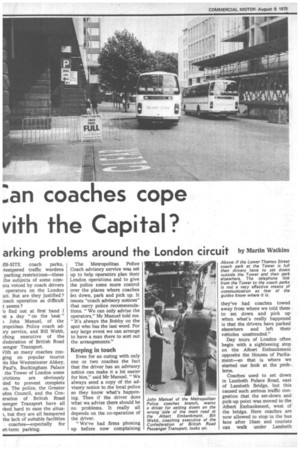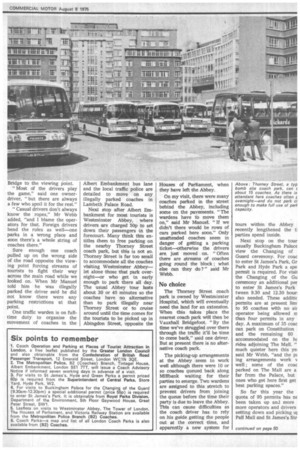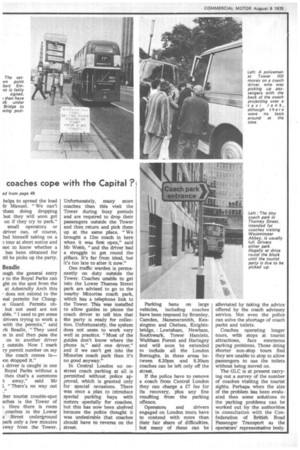..an coaches cope vith the Capital?
Page 50

Page 51

Page 52

If you've noticed an error in this article please click here to report it so we can fix it.
arking problems around the London circuit by Martin Watkins 4B-SITE coach parks, -tempered traffic wardens parking restrictions—these the subjects of some comnts voiced by coach drivers operators on the London ui't. But are they justified ? :.oach operation as difficult t seems ?
find out at first hand I rut a day "on the beat " John Manuel, of the -zopoliitan Police coach ad>ry service, and Bill Webb, ching executive of the 'federation of British Road senger Transport.
Vith so many coaches conging on popular tourist "its like Westminster Abbey, Paul's, Buckingham Palace the Tower of London some :rictions are obviously ded to prevent complete DS. The police, the Greater adon Council, and the Coneration of British Road Psenger Transport have all rked hard to ease the situai., but they are all hampered the lack of suitable facilities coaches—especially for ft-'term parking. The Metropolitan Police Coach advisory service was set up to help operators plan their London operations and to give the police some more control over the places where coaches get down, park and pick up. It issues "coach advisory notices" that carry police recommendations. "We can only advise the operators," Mr Manuel told me. "It's always the Bobby on the spot who has the last word. For any large event we can arrange to have a man there to sort out the arrangements."
Keeping in touch
Even for an outing with only one or two coaches the fact that the driver has an advisory nOtice can make it a lot easier for him," said Mr Manuel. "We always send a copy of the advisory notice to the local police so they know what's happening. Then if the driver does what we advise there should be no problems. It really all depends on the co-operation of the driver.
"We've had firms phoning up before now complaining they've had coaches towed away from where we told them to set down and pick up when what's really happened is that the drivers have parked elsewhere and left their vehicles unattended."
Day tours of London often begin With a sightseeing stop on the Albert Embankment opposite the Houses of Parliament—so that is Where we started our look at the prob-. lems.
Coaches used to set down in Lambeth Palace Road, east of Lambeth Bridge, but this caused such serious traffic congestion that the set-down and pick-up point was moved to the Albert Embankment, west of the bridge. Here coaches are now allowed to stop in the bus lane after 10am and tourists can walk under Lambeth Bridge to the viewing point.
" Most of the drivers play the game," said one ownerdriver, "but there are always a few who spoil it for the rest."
"Casual drivers don't always know the ropes," Mr Webb added, "and I blame the operators for that. Foreign drivers bend the rules as well—one parks in a wrong place and soon there's a whole String of coaches there."
Sure enough one coach pulled up on the wrong side of the road opposite the viewing point forcing streams of tourists to fight their way across the main road while we looked on. When Mr Manuel told him he was illegally parked the driver said he did not know there were any parking restrictions at that point.
One traffic warden is on fulltime duty to organise the movement of coaches in the Albert Embankment bus lane and the local traffic police are detailed to move on any illegally parked coaches in Lambeth Palace Road.
Next Stop after Albert Embankment for most tourists is Westminster Abbey, where drivers are charged 50p to set down their passengers in he forecourt. Many think this entitles them to free parking on the nearby Thorney Street coach park, but this is not so. Thorney Street is far too small to accommodate all the coaches Visiting Westminster Abbey— let alone those that park overnight—or who get in early enough to park there an day. The usual Abbey tour lasts about 30 or 40 minutes so the coaches have no alternative than to park illegally near Thorney Street or to cruise around until the time comes for the tourists to be picked up in Abingdon Street, opposite the Houses of Parliament, when they have left the Abbey.
On my visit, there were many coaches parked in the street behind the Abbey, including some on the pavements. "The wardens have to move them on," said Mr Manuel. "If we didn't there would be rows of cars parked here soon." Only unattended coaches seem in danger of getting a parking ticket—Otherwise the drivers are just moved on. "Often there are streams cof coaches going round the block ; what else can they do?" said Mr Webb.
No choice
The Thorney Street coach park is awned by Westminster Hospital, which will eventually need the land for an extension. When this takes • place the nearest coach park will then be Vauxhall Bridgefoot. "By the time we've struggled over there through the traffic it'll be time to come back," said one driver. But at present there is no alternative coach park.
The picking-up arrangements at the Abbey seem to work well although there were 10 or so coaches queued back along lVfillbank waiting for their patties to emerge. TWO wardens are assigned to this stretch to prevent drivers from joining the queue before the time their party is clue to leave the Abbey. This can cause difficulties as the coach driver has to rely on his guide getting the people out at the correct time, and apparently a new system for tours within the Abbey recently lengthened the ti parties spend inside.
Next stop on the tour usually Buckingham Palace view the Changing of Guard ceremony. For coac to enter St James's Park, Gr Park and Hyde Park a spe permit is required. For viSii the Changing of the Gu ceremony an additional per to eater St James's Park tween 9.30 and 12.30 houn also needed. These additic permits are .art present lira to 95 coaches with no sir operator being allowed rri than four permits in any day. A maximum of 35 coac can park on Constitution and the remaining 60 accommodated on the hc rides adjoining The Mall. " much quieter here this ye said Mr Webb, "and the pi ing arrangements work v well; some of the coac perked on The Mall are a far from the Palace, but ones Who get here first get best parking spaces."
So far this year the quota of 95 permits has nE been taken up and more more operators and drivers setting down and picking ui Pall Mall and St James's Str helps to spread the load 4r Manuel. "We can't them doing dropping butt they Will soon get on if they try to park."
small operators or driver can, of course, ind himself taking on a r. tour at short notice and not to know Whether a has been obtained for til he picks up the party.
Beadle
augh the general entry s to the Royal Parks can gilt on the spot from the at Admiralty Arch this r does not extend to the nal permits for Changie Guard. Permits obbUt not used are not able. "I used to get some drivers trying to work a with the permits," said .rk Beadle, "They used it in and then pass the on to another driver outside. Now I mark ry permit number on my the coach comes in— on stopped it" a driver is caught in one Royal Parks without a then that's a summons t 'away," said Mr 1. "There's no way Out
PI
••
ter tourist trouble-spot aches is the Tower of 1. Here there is room coaches in the Lower s Street underground park only a few minutes away from the Tower. Unfortunately, many more coaches than this visit the Tower during busy periods and are required to drop their passengers outside the Tower and then return and pick them up at the same place. "We brought a 12m °oath in here when it was 611E4 open," said Mr Webb, "and the driver had a struggle to get round the It's far from ideal, hut it's too late to alter it now."
One traffic warden is permanently on duty outside the Tower. Coaches unable to get into the Lower Thames Street park are advised to go to the nearby Minories coact park, which has a telephone link to the Tower. This was installed to allow guides to phone the coach driver to tell him that the party is ready for collection. Unfortunately, the system does not seem to work very well in practice. "Most of the guides don't know Where the phone is," said one driver," and if we can't get into the Minories coach park then ft's no good anyway."
In Central London no onstreet coach parking at all is permitted without pace approval, which is granted only for special occasions. There was once a plan to introduce special parking bays with meters specially for coaches, but this has now been shelved because the police thought it was undesirable that coaches should have to reverse on the street. Parking bans on large vehicles, including coaches have been imposed by Bromley, Camden, Hammersmith, Kensington and Chelsea, Knightsbridge, Lewisham, Newham, Southwark, Tower Hamlets, Waltham Forest and Haringey and Will soon be extended to include all the London Boroughs. In these areas between 6.30pm and 8.30am coaches can be left only off the street.
If the police have to remove a coach from Central London they can charge a £7 fee for its recovery, plus any fine resulting from the parking offence.
Operators and drivers engaged on London tours have to contend with more than their fair share of difficulties, but many of these Can be alleviated by taking the advice offered by the coach advisory serVice. Not even the pace can solve the shortage of coach parks and toilets.
Coaches operating longer tours, with stops at tourist attractions, face enormous parking prOblems. Those doing Shorter non-stop tours find they are unable to stop to allow passengers to use the toilets without being moved on.
The GLC is at present carrying out a survey of the number of coaches Visiting the tourist sights. Perhaps when the size of the problem has been evaluated then some solution's to the parking problems can be worked out by the authorities in consultation with the Confederation of British Road Passenger Transport as the operators' representative body.




































































































